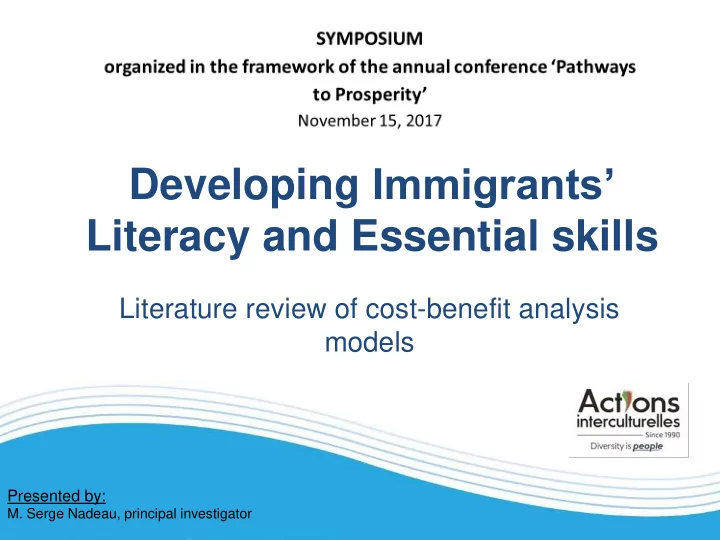

Developing Immigrants’ Literacy and Essential skills Literature review of cost-benefit analysis models Presented by: M. Serge Nadeau, principal investigator
Objectives of the literature review • Summarize the state of knowledge in the area of cost- benefit analysis models of immigrant training programs. • Specifically, in terms of: – modeling techniques (to define the analytical framework); and – results from studies already completed. Actions Interculturelles de Développement et d’Éducation 2
Key messages • Complete lack of cost-benefit studies on immigrant training program s. – The study that most closely resembles ours is that of Gyamarti and al. (2014) which focuses on workplace training • Studies indirectly related to ours: – Gray and Morin (2013) attempt to evaluate the cost-benefit impact of a literacy training program in British Columbia. The authors conclude very little (very high program attrition rate and incomplete tracking data). – Murray and al. (2009) measure the net social gains of increasing the literacy rate of all Canadians to a level 3. They estimate an internal rate Actions Interculturelles de Développement et d’Éducation of return on investment of up to 47%. – Green and Riddell (2003) conclude that literacy has a significant impact on salaries. – Emery and Ferrer (2010) assess the costs and the benefits of a fund that aims to provide foreign-trained immigrants with micro-loans to help finance their training, skills upgrading, and expenses for professional accreditation. They estimate the program would have an internal rate of return varying between 18% and 47%. 3
Key messages about the methodology • The importance of having representative control groups. • Observation frequency should be at least quarterly. • Variables to observe: • Age • Education • Gender • Employment status • Country of origin • Wage history • Mother tongue • Other sources of income Actions Interculturelles de Développement et d’Éducation • Employment history • Training costs • Languages spoken • Marital status 4
We are at your disposal should you need addition information. Actions interculturelles de développement et d’éducation (AIDE) 465, rue Lawford, Sherbrooke (Québec) J1G 2C2 Telephone : 1 819 822-4180 Fax : 1 819 822-4415 Website : www.aide.org E-mail address : aide@aide.org 5
Recommend
More recommend